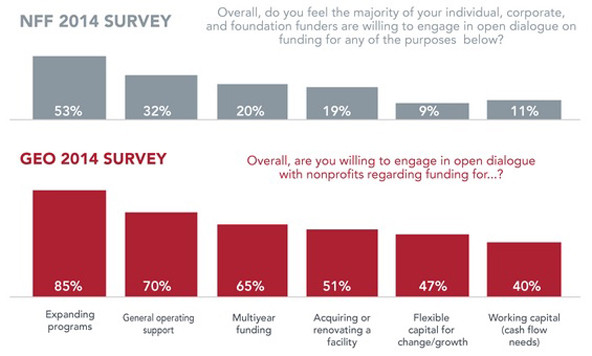If you spend enough time in rooms full of grantmakers, chances are you’ll hear some jokes about how grantmakers are always the smartest ones in the room, are the best dressed, and tell the funniest jokes, because what nonprofit leader looking for funding would say otherwise? (Insert canned laughter here.)
There is an element of truth behind these quips, however, and it’s something we at Grantmakers for Effective Organizations (GEO) hear often from members of our community. Despite grantmakers’ best intentions to engage grantees in their work and build strong relationships, many don’t feel they’re including their grantees in the best way. They wonder if they’re asking their grantees the right questions and truly listening to their answers; they struggle with the best way to engage grantees to inform strategy, co-create programs, or take part in decision-making; or they question whether or not they have a relationship with their grantees that allows for open and honest dialogue. These are all critical aspects of what GEO refers to as grantee inclusion.

This lack of authentic grantee inclusion stands in the way of grantmakers’ and grantees’ ability to partner effectively to make real and lasting change in people’s lives. We know that those closest to the problems we’re trying to solve have the best insights into how to address them. We also know that grantmakers that are more connected to their grantees are more likely to provide the types of support critical to nonprofit success. And if nonprofit leaders don’t feel they can be open and honest with their funders, grantmakers will lose the perspectives and insights they need to create the greatest impact.
Data from our field studies support this. Fifty-three percent of staffed foundations in the United States solicit feedback from their grantees, and the majority that do so use this feedback to help shape policies, program areas, and strategy. It’s promising that foundations are seeking this input, but asking for input assumes that grantees feel comfortable giving feedback or discussing their challenges—which isn’t always the case. For example, we see a gap between nonprofit and foundation leaders’ perceptions of how open grantmakers are to discussing various types of financial support nonprofits need.
 Nonprofit and foundation leaders disagree about whether foundations are open to dialogue on financial issues. (GEO’s 2014 Field Study and Nonprofit Finance Fund’s 2014 Survey)
Nonprofit and foundation leaders disagree about whether foundations are open to dialogue on financial issues. (GEO’s 2014 Field Study and Nonprofit Finance Fund’s 2014 Survey)
Finding ways to narrow perceived gaps and cultivate authentic grantee inclusion is a conversation percolating in the field among many organizations, as examples in recent articles from Stanford Social Innovation Review, Nonprofit Quarterly, and Exponent Philanthropy's PhilanthroFiles show. But while this conversation is gaining traction, grantmakers—because of the inherent power dynamic—must be willing to take the first step; they must be willing to put in the work and make changes when needed.
Truth is, barriers exist that prevent authentic inclusion, including power dynamics, internal processes, and foundation culture. It’s not always as simple as flipping the switch, and introducing grantee surveys or feedback loops—what we’ll call “technical” solutions. These technical solutions are incredibly important, but grantmakers also need to tackle “adaptive,” relational challenges—challenges that require changes in behavior, practices, and ways of working. Tackling adaptive challenges also requires that grantmakers give up some aspects of their power, decision-making, and authority. That’s because grantee inclusion isn’t just something grantmakers do; authentic inclusion requires embracing a certain mindset and way of being.
Over the next few weeks, this article series will continue the conversation around cultivating authentic grantee inclusion through a variety of perspectives, including those of nonprofit leaders at Playworks and URGE, thought leaders at organizations such as Building Movement Project and Collective Impact Forum, and others. We’ll also hear from participants of GEO’s Change Incubator, an intensive cohort program where members are learning together, identifying challenges that stand in the way of authentic grantee inclusion, and testing new ways of engaging that will hopefully result in lasting change.
The series will explore various aspects of grantee inclusion, such as:
- How grantmakers’ organizational culture gets in the way of inclusion, trust, and openness
- What it takes for grantmakers to share power and decision-making
- The tensions between moving quickly to achieve results and taking the time needed to build trust
- The importance of experiments when tackling adaptive challenges
- Tools and techniques—the technical solutions—that help grantmakers gather grantee feedback and equalize the power imbalance
- What it looks like when nonprofits are working in trusting partnerships with their funders
GEO and others working to enhance grantee inclusion are united by a common vision, where grantmakers—who must take the first step because they hold the power and the money—can engage the voice and perspectives of grantees and other stakeholders in meaningful ways so that, together, they can achieve lasting social impact.
It’s a discussion we must have and a way of being we must embrace. We look forward to offering perspectives and ideas from all sides of philanthropy and the nonprofit sector, and we invite you to take part in the conversation.
Support SSIR’s coverage of cross-sector solutions to global challenges.
Help us further the reach of innovative ideas. Donate today.
Read more stories by Lori Bartczak.

